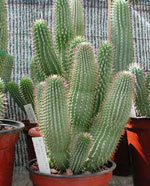
Hoodia gordonii, "Whoo De AH", is the botanical name for a leafless, spiky succulent plant that grows throughout the semi-arid areas of Southern Africa primarily the Kalahari desert. The San (local inhabitants) have rationally used Hoodia stems to stave off hunger and thirst when on long journeys, as it acts as an appetite suppressant. Hoodia is a Succulent botanical and is part of the Genus: Trichocaulon and belongs to the Family Name: Asclepiadaceae. There are approximately twenty plants within the Hoodia genus family, however, Hoodia Gordonii is the unique plant that South African San bushmen have used for generations to endure long hunting expeditions. Hoodia Gordonii is a leafless spiny succulent plant ( not a cactus ) with fleshly finger-like stems. Rows of thorns are present along the stems, bearing flesh coloured flowers. Hoodia Gordonii grows naturally in the harsh desert conditions of South Africa. Now Hoodia Gordonii has been found in the semi-deserts of Zambia, Zimbabwe, Botswana, Namibia, Angola, the Republic of South Africa, and now found in some other arid regions of South American Nations such as Chili, Peru and some regions of West China including Gansu, Sichuan and Shanxi.
Scientists at the South African Center for Scientific and Industrial Research were the first to successfully prove that Hoodia contains a miracle molecule that suppresses the appetite. Later, a human clinical trial was conducted by scientists in Leicester England. A group of morbidly obese men and women participated. Half the group were given Hoodia and half were given a placebo. At the end of 15 days, the group on Hoodia had reduced their food intake by 1000 calories a day. Given the average daily diet is around 2200 calories, this was a stunning success. It has been established that the P57 molecule found in wild harvested Hoodia Gordonii works by mimicking the effect that glucose has on nerve cells in the brain in effect fooling the body into thinking it is full, even when it is not, thus curbing the appetite. Laboratory experiments show animals automatically restrict their food intake when taking hoodia orally. Rats, a species that will eat anything from meat and plants to indigestible fiber, lowered their dietary calorie intake to a degree that made them get thin when fed comparative amounts of hoodia.
In the wild Hoodia takes 5-6 years to mature but is now being cultivated in as little as 2 years commercially in sustainable quantities and has become widely known for its effects as an appetite suppressant. The Hoodia Gordonii plant originated in the southwestern part of Africa and grows best in the semi-arid areas of South Africa primarily the Kalahari. In its native habitat it is extremely difficulty to identify because it looks similar to succulents of the same family of which there are many. Only an experienced botanist or as the case in South Africa with Hoodia Gordonii a San people can identify the plant prior to it's blooming.
The pure Hoodia that contains appetite suppressant qualities is only grown in one specific region in South Africa. If the Hoodia is from China, USA or any other part of the world and is not accompanied by a South African Government Certificate of Authenticity, the product is inferior and ineffective. Hoodia Gordonii is a plant - a leafless succulent. Not a Cactus nor a Herb. In South Africa Hoodia Gordonii is classified as a foodstuff, which is testimony to how safe the product really is. All over the world, people are trying to buy hoodia, and there just isn't enough supply to go around. The succulent growers have been wiped out. The seed providers have virtually no inventory left. And since hoodia takes more than six years to grow to harvesting height, there's going to continue to be a great hoodia shortage until at least 2010, maybe beyond. All this means that if hoodia really catches on with the public -- the supply will be even tighter for many years. Prices are going to go up, and eventually, only the wealthy may be able to afford the pills necessary to lose weight.
There are no known reported side effects to using Hoodia Gordonii that have been reported to date. Hoodia was eaten as a fresh food by the San tribe for thousands of years with zero side effects. There are no known adverse side effects as a result of taking Hoodia in conjunction with prescription medications and other herbal supplements. However, if you are presently using any prescription medication and are under the care of a physician, you should always consult your physician before taking any supplement medication. Hoodia Gordonii is famous for its effects as an appetite suppressant and mood enhancer. Excellent results have been reported from people using it as part of a weight loss program, leading to many international companies making and selling Hoodia as a "new miracle diet pill".

|